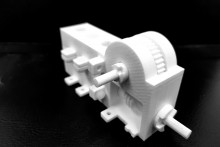Foad Sojoodi Farimani is a PhD candidate at the Surgical Robotics Lab. Together with his supervisor Professor Sarthak Misra, he started designing PneuAct because he needed a motor that could power robots inside MRI (magnetic resonance imaging) machines - robots that could perform surgeries on cancer patients, for example.
Surgical robotics
‘Cancer is one of the leading causes of death in the developed world,’ says Farimani. ‘To diagnose it as soon as possible we use imaging, such as ultrasound, X-rays or CT. Imaging is required to be sure that biopsies are taken from the right tissues. Out of these options, MRI is the most precise and the safest. However, the environment inside an MRI machine is very cramped. To take a biopsy, the patient needs to be taken out of the MRI machine for needle placement and then be put back in to check if the needle is in the right place. If all these steps could be done directly inside the machine, a lot of time could be saved and patients’ complications would be reduced.’
'A piece of metal inside could literally kill a person.'
‘Robots could perform these minimally invasive surgeries inside the MRI machine,’ continues the scientist. ‘But conventional robots can’t go in, because they are made of metal and electronics. Conventional electromagnetic motors are prohibited in the MRI room. The magnetic field in these machines is so strong, that it can easily pull in metal objects from across the room. A piece of metal inside could literally kill a person. To make MRI compatible robots, one of the best solutions is therefore to use pneumatic stepper motors to control the motion of the robots.’

Made in a few hours and in any size
Which is where PneuAct comes in. It is the first pneumatic stepper motor that is completely 3D printed. It doesn’t include any electronics or metals, meaning it can operate in intense magnetic fields and other challenging environments. ‘It’s made of very good recyclable plastic ABS, which means it can be disposed right after a surgery and reused immediately. That makes it suitable for medical applications. Moreover, it’s very precise, fast, extremely cheap and easy to produce. It can be made within a few hours – in any size thanks to the fact it is parametrically designed,’ says Farimani.
Hospitals aren’t the only places where the motor could come in handy, adds the UT researcher. ‘It could be used in other environments where electromagnetic motors don’t work. For example, after the Fukuschima nuclear disaster conventional robotic systems would fail while working in the area, because of their electromagnetic motors. PneuAct can function even if exposed to radiation and it could be produced out of material that is fire resistant, if required. It could also be helpful in space explorations – send a few 3D printers to Mars and you can print as many as you like. The applications are limitless.’







